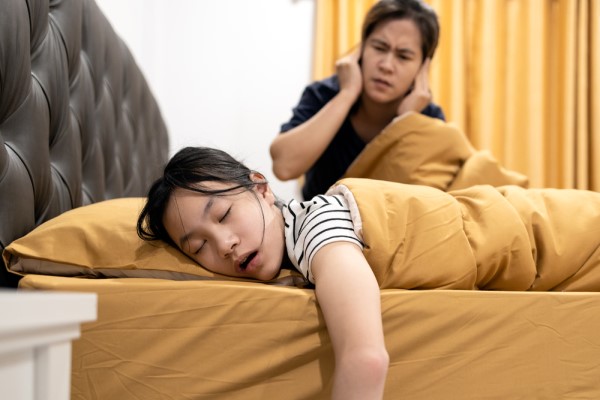What Can Cause Sleep Apnea?

Sleep apnea is a sleep disorder that causes sleeping to stop for a few seconds repeatedly during sleep. The disorder causes disturbances in air circulation and oxygen transfer in the blood.
What are some causes of sleep apnea?
There are two types of sleep apnea: obstructive sleep apnea and central sleep apnea. Here is a brief overview of each type:
Obstructive sleep apnea (OSA)
OSA occurs if there is a blockage in the airway, typically because of the soft tissues in the throat, like the tongue, collapsing while sleeping.
Certain factors increase the chance of getting affected by obstructive sleep apnea, such as larger neck size. This usually happens when a person is obese or overweight and has excess fat deposits near the upper airway, making the airway narrower, thereby making it difficult for air to pass through the throat and to the lungs, resulting in breathing interruptions.
OSA might develop in children as well. It can be caused by issues like a tumor or growth in the airway and congenital disabilities like Down syndrome.
Central sleep apnea (CSA)
This type of sleep apnea occurs when a person’s brain fails to coordinate with their muscles. This leads to disruptions in the person’s breathing as organs that regulate breathing — like the lungs — fail to get the signals they need to function correctly.
The root causes of CSA are not always understood. However, some CSA cases are linked with other illnesses such as heart conditions, kidney problems, and stroke. High-altitude CSA can also occur if you are above 15,000 feet.
Drugs and medications like fentanyl and hydrocodone are also known for causing CSA. Such cases can be treated by making appropriate modifications to the patient’s issues.
Conditions such as head injury, brain tumors, premature birth, smoking during pregnancy, and issues with the skull base can cause CSA in children.
Major risk factors for sleep apnea
Sleep apnea affects a large number of people. Some of the risk factors for this disorder include:
- Being over the age of 40
- Being male
- Overweight
- Allergies
- Hypothyroidism
- Smoking, alcohol, or drug use
- Medical conditions
- Deviated septum
- Excess growth because of hormones
- Having a neck size of 16 inches or more for women and 17 inches or more for men
- A family history of sleep apnea
- Large tongue or tonsils
- A small jaw bone
- Obstructions in the nasal cavity due to sinus, allergies, or deviated septum
Left untreated, sleep apnea can lead to issues such as stroke, high blood pressure, diabetes, depression, and headaches. It can also cause a worsening of ADHD symptoms, as well as heart failure, heart attacks, and irregular heartbeats.
Get treatment for sleep apnea
Sleep apnea is a serious health condition that can negatively impact your mental and general health. Sleep apnea leaves you feeling fatigued during the day, restless at night, and irritable. It can impact your personal and professional life. Fortunately, a dentist can help you reduce its effects with appliances like mouthguards that help keep your airway open while you sleep. It is an effective treatment for mild to moderate cases of sleep apnea.
Contact our Miami clinic to set up an appointment with a dentist to learn more about treatment options for sleep apnea.
Request an appointment here: https://www.southfloridadentalarts.com or call South Florida Dental Arts at (305) 230-4041 for an appointment in our Miami office.
Check out what others are saying about our dental services on Yelp: Do I Have Sleep Apnea in Miami, FL.
Related Posts
Sleep apnea is a serious sleep disorder that affects millions of individuals worldwide. It occurs when breathing repeatedly stops and starts during sleep, disrupting rest and potentially causing long-term health consequences. Many people are unaware that a general dentist plays a key role in diagnosing and managing sleep apnea, particularly with non-invasive treatment solutions. By…
Dental sleep medicine treatment focuses on treating sleep apnea and other related conditions. More dentists are choosing to practice in this line of work because there are actually a lot of good dental sleep apnea treatments available to patients. Modern-day dentistry has evolved quite a bit, which has allowed for the evaluation of all kinds…
Are you looking for CPAP alternatives to treat your sleep apnea? Obstructive sleep apnea is a common condition that impacts millions of individuals all across the globe. Due to this condition, the patient’s airway closes while they are asleep. This can lead to symptoms like difficulty staying asleep throughout the night, snoring, morning headaches, and…
Oral appliance therapy is ideal for people with mild to moderate obstructive sleep apnea (OSA). This dental device keeps the airway open during slumber at night. It prevents sudden and short breathing cessation that lasts for 1-2 seconds or longer. Severe cases can cause serious health issues such as hypertension, heart attack, and stroke. Keep…
